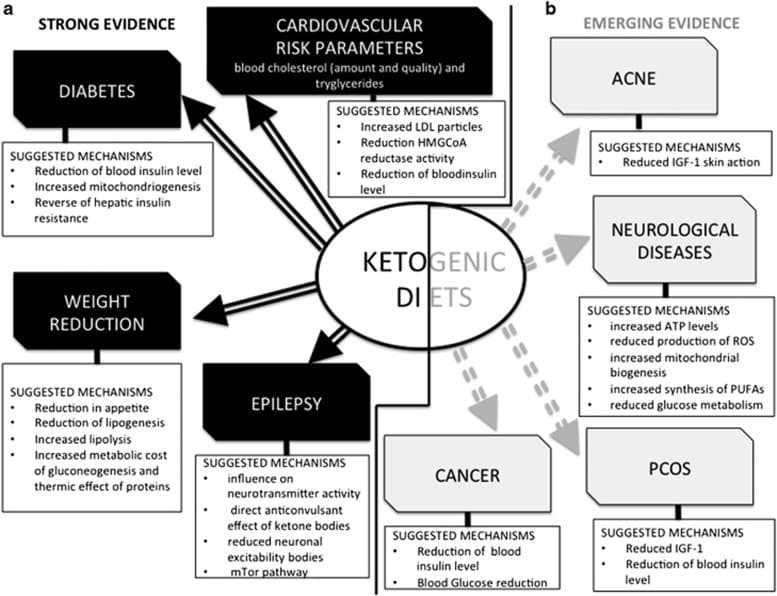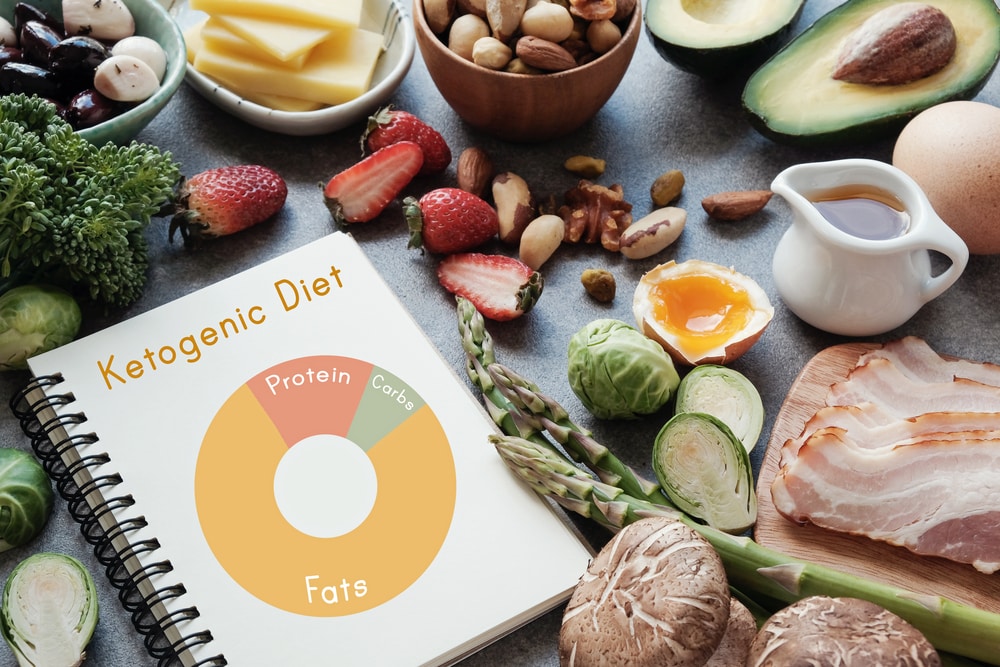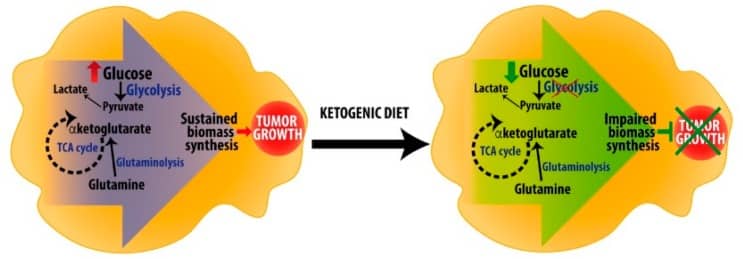Cancer is one of the biggest challenges public health systems worldwide face. The American Cancer Society reports cancer is the second leading cause of death in the United States.
Why are we seeing such high incidences of cancer? Could it be that there is a link between the foods we eat in the western world and cancer?
You may know that the ketogenic diet was adopted as treatment for pediatric epilepsy almost 100 years ago (1921).
Research in 2019 still supports the use of the keto diet for epilepsy, and confirms the application of the ketogenic diet for other neurological disorders such as autism and Alzheimer’s Disease.
If the ketogenic diet can be used for treatment of neurological conditions, can the ketogenic diet be used to treat cancer? Lets take a look at what the research says.
Sugar and Cancer

When I read an abstract of an article (Tanasova et al. 2018, Targeting Sugar Uptake and Metabolism for Cancer Identification and Therapy: An Overview) I was shocked, to say the least.
In six lines, this article confirmed two things. Cancer cells feed on sugar (“…the sugar moiety anchoring the bioactive cargo to cancer cells”) and, scientists are considering how to create new medicines that stop cancer cells from being able to use the sugar:
...high demand for sugar nutrients in cancers provided a new avenue to target cancer cells with metabolic or sugar uptake inhibitors to induce cancer cells starvation or death.
Source
Alarmingly, the link between sugar and cancer is not new.
In fact, it was established in the early 1970’s that rats fed a high sugar diet produced the same enzyme that was associated with bladder cancer in humans.
Interestingly, the results of this study determining sugar as a potential carcinogen were never published at the time.
Why? The study was secretly funded by the Sugar Research Foundation, and subsequently terminated.
An Australian study published just last week (March 2020) (Dewdney B, Roberts A, Qiao L, George J, Hebbard L. A Sweet Connection? Fructose’s Role in Hepatocellular Carcinoma. Biomolecules. 2020; 10(4):496) discusses the toxicity of fructose to the liver.
This study suggests that fructose induces cells into a stressed state metabolically. The cancer cells then adapt to this stressed state and in turn, maintain cell growth.
This study also briefly discussed the association between sugar consumption and other types of cancer:
Reports have shown a positive association with sugar consumption, either as glucose, fructose, or sugar-sweetened beverages, and pancreatic cancer.
Source
We know that sugar is the enemy in terms of weight gain, but having a deeper understanding of how sugar impacts your body at a cellular level and over time, points to connections between sugar consumption and cancer.
In 2014, Paoli et al. published this image below outlining the strong and emerging evidence of the use of a ketogenic diet therapeutically for certain medical conditions.

Whilst more evaluation is needed, it seems to be a plausible argument that eliminating as much sugar from your diet as possible may assist to either stop or slow the growth of cancer.
The Keto Diet for Cancer

In the last 7 years or so (2012 to 2019) there has been numerous clinical trials undertaken in relation to cancer and the keto diet.
These trials are to evaluate the effectiveness of the ketogenic diet for the prevention of cancer, if the keto diet may slow or stop the growth of cancer, and if the keto diet is the best diet for cancer patients undergoing chemotherapy and radiotherapy treatments.
It has been established that ketone bodies have more than one effect within the human body. Some tumors are highly glycolytic, meaning that they use sugars to grow and expand.
The image below explains this process visually:
In brain tumors, scientists have found a correlation between a reduction in blood glucose levels (through use of the ketogenic diet) and a reduction in tumor growth.
In another study, published in 2019, women with endometrial cancer and ovarian cancer on a ketogenic diet were compared with the American Cancer Society diet, which is a high fiber, low fat diet.
The results of tumor growth are unknown, as the study was more focused on blood lipid levels. After 3 months on the keto diet there was no differences of any significance in blood fats between the ketogenic diet and the American Cancer Society diet.
This suggests that the ketogenic diet may be safe for cancer patients to follow.
When it comes to breast cancer, evidence is suggesting that reducing carbohydrate intake post a breast cancer diagnosis, reduces the risk of recurrence.
This article, (Consideration of Ketogenic Metabolic Therapy as a Complementary or Alternative Approach for Managing Breast Cancer) confirms that statement above and once again, that sugar feeds cancer cells.
It is well-known that glucose and hyperglycemia contribute to rapid breast cancer growth.
Source
This article discusses the ketogenic diet being used as adjunct therapy with traditional therapies such as low dose chemotherapy.
Confirming that ketone bodies cannot replace glucose as an energy source for cancer, this article reiterates that the major ketone body, beta-hydroxybutyrate (BHB) can not stimulate breast tumor growth.
This article also discusses how ketone bodies and fatty acids cannot act as respiratory fuels for tumor cells containing defects in mitochondrial structure and function.
What does this mean? In short, following a ketogenic diet decreases circulating levels of glucose and insulin, both of which are needed for rapid tumor growth.
There is a caveat on this however, as this study here shows. The ketogenic diet is only beneficial when used in conjunction with calorie restrictions.
Eating an unrestricted keto diet (as many calories as you want) caused weight gain and increased glucose levels in mice. The results were similar to a study of a high fat, high sugar diet in mice. As usual, it’s all about balance.
The Keto Diet for Inflammatory Disorders
This study, published in October 2019 (Ketogenic Diet: A New Light Shining on Old but Gold Biochemistry) confirms that ketone bodies are responsible for natural immune responses and regulation of inflammation.
This means, that diseases associated with inflammation could possibly be treated with a ketogenic diet.
The study confirms there is evidence for this, but before western medicine will adopt any new practice, long term clinical trials will be needed.

Keto and Cancer – Our Conclusions
From the many studies, clinical trials, articles and abstracts I’ve researched to write this article, it appears that science is finally realizing there are connections between our health and the foods we eat.
The conventional food pyramid is being turned on its head. High fat low carbohydrate diets such as the ketogenic diet are proving to be beneficial for overall health and well being as well as limiting disease progression.
The general consensus however, is that more research is needed. Longer clinical trials and surveillance of cancer patients adopting a ketogenic lifestyle is needed.
Compliance with the ketogenic diet is also a contributing factor, with one study contributing the recurrence of non curable breast cancer and subsequent death of a patient to the fact that she was not able to sustain a ketogenic lifestyle.
Calorie restriction and the ketogenic diet is also important. Whilst we’d all love to eat high calorie fat bombs day in and day out, the keto diet won’t be any more beneficial than the sugar laden ‘low fat’ diet that’s been recommended for decades.
The one thing we can say for sure, is there is a definite connection between sugar and the growth of malignant tumors, that is, cancer.

















